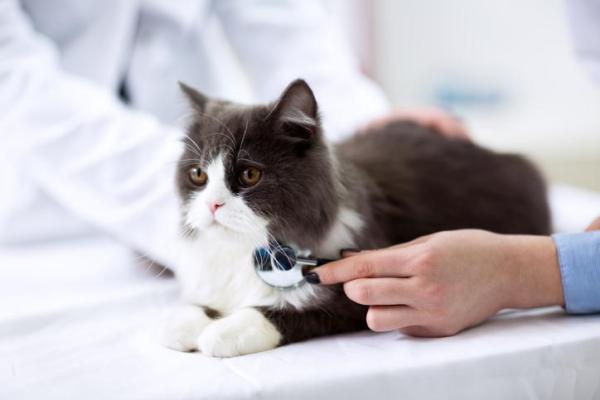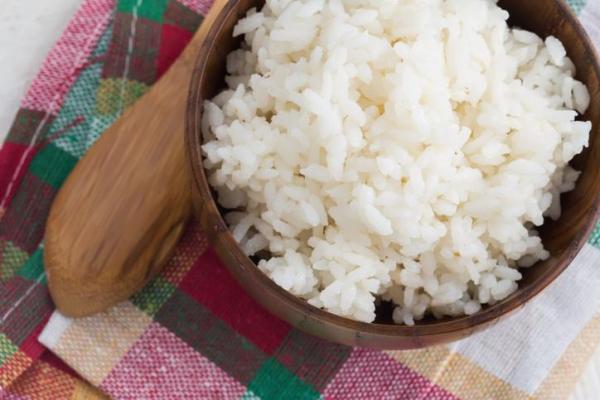
If you want to know can cats eat rice, the short answer is yes. Of the many different human foods cats can eat, rice is one which shouldn't provide any harm to your feline. This, of course, depends on how it is eaten and how it affects the rest of their food intake. It is also important to know that rice is not a food necessary for a balanced diet in cats. It may, however, be able to help when a cat has certain health issues such as an upset stomach.
AnimalWised not only looks into how rice affects cats, we also discuss various rice products and which circumstances might benefit from supplementing rice in their diet. This will include the nutritional properties of rice and some fast and simple rice recipes for cats you can make at home.
When should cats eat rice?
Rice is a very popular food in many different human cultures across the world. Its cultivation and preparation for consumption means it is not a natural food for wild felines. Even if it was readily accessible in the wild, it is unlikely cats would go out of their way to eat it. Cats are known as obligate carnivores, meaning they need to eat meat to get the nutrition they need to survive. Rice has little nutritional value for cats, but it can be eaten as a way to supplement their diet. For this reason it is a common ingredient in certain dry cat foods.
The reason many different types of cat food contain rice or some other grain seems to be its use as a ‘filler’. As rice is relatively healthy for cats and relatively cheap for commercial cat food producers, it can be added in small amounts to dry cat food to bulk it out. It is not commonly found in wet cat food, although some grains are often used in its gravy.
Properties and benefits of rice for cats
Although rice doesn't have many essential nutrients for cats, it is not devoid of nutritional value. Some of the nutritional value of rice is as follows:
- Rich in calories and carbohydrates
- Contains vitamin B
- Contains iron
- Provides small quantities of magnesium
The above properties of rice do not make it vital for their diet, but it can be useful in certain situations. If your cat is suffering from gastrointestinal issues, then bland food can benefit the cat by providing nutrition without upsetting digestion further. Gastrointestinal problems in a cat can be caused by various health issues such as parasitical infestation or different types of infection. It is generally considered a better type of carbohydrate than pasta or similar foodstuffs.
One of the symptoms of gastrointestinal problems in cats is diarrhea. This is caused by poor absorption in the intestines, something dry commercial cat food can agitate further. In these cases, a veterinarian may recommend a soft food diet for cats to help regulate the bowel. Any rice will be used in moderation and will only be required for a few days or until the diarrhea desists. After this time, the cat will return to its normal diet. If the cat does not stop eating rice, they may develop gas, constipation or other digestive issues.

Can kittens eat rice?
While rice might be beneficial for adult cats, the same cannot be said for kittens. Kittens should not be given rice. Commercial cat food is sold in different formulas for the different stages of a cat's life. This is because their nutritional needs change as they develop. A kitten will have different nutritional needs to a senior cat.
Even a kitten with diarrhea should not be given rice. At this early stage they will need a lot of protein and other nutrients to grow properly. Rice can take away from these necessary nutrients, so given it to a kitten can negatively affect their development. If your kitten has diarrhea, you should take them to the vet who will provide prescription for a suitable kitten formula specific for diarrhea.
Can all cats eat rice?
As we state above, kittens should not be given rice, but there are other cases where rice for cats should be avoided. While overweight cats will need a special diet to lose weight, rice might not always be a good idea. A 2004 study in the journal Nutrition Research shows an experiment carried out on overweight cats about how dietary carbohydrates affect glucose concentrations and insulin secretion[1].
The study tested overweight cats on their diet of a certain period of time. One group was given sorghum/corn based diet and another was given a rice-based diet (making up 33% of the overall feeds as starch content). The ice-based diet showed the cats both put on more weight and had higher glucose concentrations. This results show that overweight cats fed on a rice-based diet had a greater likelihood of developing diabetes.
Obese and overweight cats should not be given rice to supplement their diet. Although it is low in fat, the negative effect it can have on glucose levels and insulin secretion is a risk factor.

Different rice products for cats
While we have been majorly talking about using cooked rice in a cat's diet. However, rice is a very versatile foodstuff which can be used in a variety of products. There are also different varieties of rice you can buy, but are they all safe for cats to eat?
Can cats eat white rice?
There are different types of white rice, as the term refers to the milling process which results in its bright white color. Basmati, jasmine and common long grain rice are all types of white rice, although only the later is usually often referred to simply as ‘white rice’ and you can get brown versions of them too.
White rice is fine to eat, but you have to be careful how it is prepared. If it is dry or undercooked, the rice may not only be unpalatable, but it can cause stomach upset. Also, the rice has to be from a good course. Some rice may have pesticides or other nasty chemicals which can harm your cat.
Can cats eat brown rice?
Brown rice is not milled as extensively, resulting in a grain which has higher dietary fiber. However, cats do not generally need fiber to meet their dietary needs, so it won't provide much benefit to the cat. Brown rice also contains more of the bran which surrounds the grain underneath the husk. This can provide some issue for felines.
Can cats eat rice bran?
Rice bran surrounds the grain and can be bought in packs to be used as a supplement for humans. This is because it is high in fiber, is high in antioxidants and even contains vitamin E. However, just because it is a food good for humans, doesn't mean it's going to be healthy for cats.
A 2002 study from the Journal of Nutrition suggests that rice bran can interfere with taurine metabolism[2]. Taurine is essential for a cat's general health, but particularly for elements such as their vision. They cannot synthesize it well on their own, so they need to get it in their diet. While the study is limited, it is not worth feeding rice bran to your cat as it will provide no benefit and may result in dietary problems.
Can cats eat Rice Krispies?
Some cereals look like dried cat food (without the milk of course). Rice Krispies may fall into this category, but there is little to no benefit in cats eating cereal. They provide unhelpful carbohydrates, but more than the grains themselves, they are notorious for being covered in additives. These include sugars, sweeteners and other harmful ingredients.
Sugar is not toxic for cats, but it can lead to obesity and diabetes. Fortunately, most cats will probably not be interested in eating cereal in the first place. The same will go for Rice Krispie squares and other sweet treats which use cereal.
Can cats eat chicken and rice?
A dish which is likely more appetizing for cats is a dish like chicken and rice. This dish can be found in various culinary cultures with various flavor profiles. While chicken is in itself good for cats, the recipes you find for many chicken and rice dishes will have flavors and spices which are potentially harmful. Even natural ingredients like onion can be harmful to cats.

Recipes with rice for cats
Since cats cannot have the same types of meals prepared for many humans, simple recipes are best. AnimalWised brings you some of these recipes in case you want to prepare some homemade food for your cat.
Chicken and rice
The mixture of rice and chicken will allow your cat's digestive system to regulate if they have had some gastrointestinal problems. However, the cat will still need its essential nutrients. The chicken can also serve to help give the cat the energy required for recovery.
For this homemade recipe for cats you will need:
- ½ cup of rice
- ½ cup of boneless chicken, without skin or fat
- ¼ carrot
To prepare the meal, boil the chicken in water, without adding salt, onions or condiments. While cooking, dice the carrot into small cubes. Then, remove the chicken from the water (reserve the water) and cut into pieces. Cook the rice with the pieces of chicken and the chopped carrot. Instead of cooking the rice in fresh water, use the broth that you reserved, so it will be more appetizing.
When the rice is ready, wait for it to cool and serve. Give them the same amount of food as you would if giving your cat wet commercial food.
Fish and rice
We can also substitute chicken for fish. Fish is not only very good for cats, but is also particularly appetizing. However, not all fish is advisable. Canned tuna usually contains mercury, bisphenol and high levels of sodium, so it should be avoided. Also, a lot of tuna comes in oil which will add unhealthy fat to the cat's diet. Fresh tuna and other types of fresh fish should be fine, but ensure you remove any bones.
Mixing rice with fish is an attractive option, since you will be providing omega 3 fatty acids. The fish must be cooked. Raw fish is theoretically OK for your cat, but it will vary in quality and can provide a health risk, so it too should be avoided.
For a homemade fish and rice dish for cats you will need:
- 300 grams of fish
- ½ cup of rice
- 1 carrot
The preparation is the same as the above one for chicken and rice. Cook the fish in water without adding condiments or other additives. Cut the carrot into squares or grate it. Once the fish is ready, let it cool and crumble while removing the bones if necessary. Cook the rice by mixing it with the carrot and the shredded fish, using the water in which you prepared the fish. The fish and rice dish can be stored in the refrigerator for up to 2 days. If you do not have carrot, you can use alternatives such as green peas, sweet potato or other options from our list of vegetables suitable for cats.

If you want to read similar articles to Can Cats Eat Rice? - Different Rice Products, we recommend you visit our Homemade diets category.
- Nutritional guidelines for complete foods and supplements for dogs and cats - Fédération Européenne de l'industrie des aliments pour animaux familiers (FEDIAF) or the European Pet Food Industry